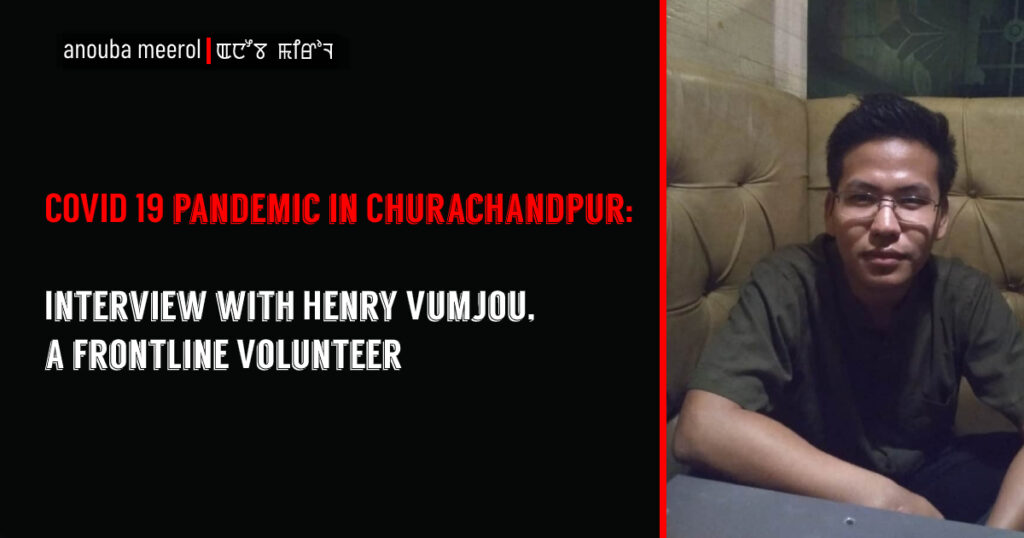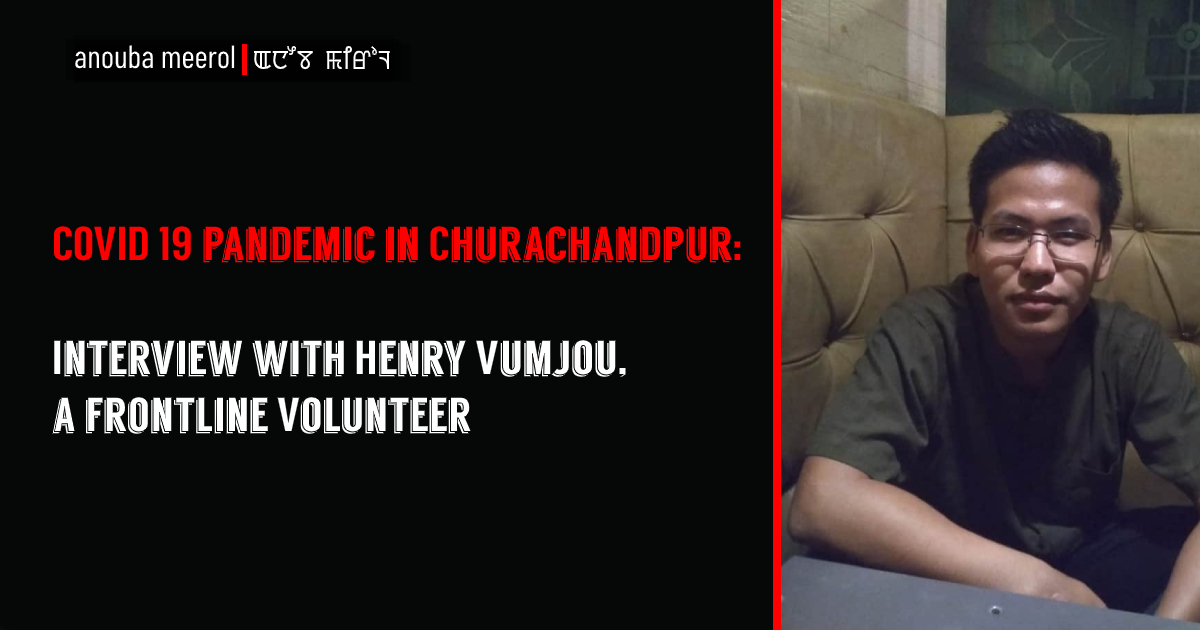
[Henry Vumjou is a Phd Candidate in IIT Bombay. He is one of the first from Churachandpur district to be quarantined. He is now working with CCPUR Covid19 Relief Support Group, a platform providing support and doing relief work in Churachandpur.]
Anouba Meerol: What is the current situation of Churachandpur in relation to the ongoing COVID 19 pandemic? Can you elaborate on the differences between the situation in town and the interiors?
Vumjou: Churachandpur is one among the districts of Manipur with the highest number of positive cases till date. Fortunately, for us residents, all cases have been contained within the quarantine centres so far. However, there’s rumour that there is possibility of community transmission in a particular area, as we speak, which awaits official confirmation. If there is, then the situation is already bad. As a whole, officially, the current situation is that Covid19 is under control within the district. All thanks to the District Administration and all frontline warriors who have been tackling the onslaught of the pandemic in the best manner they can.
Regarding the interior areas of the district, to my surprise, the situation is efficiently managed as far as I know. I had interacted with quite a number of volunteers in the interior areas. From what I was told and from what I saw, the volunteers in the interior areas are much more stringent in their approach in tackling the pandemic. For instance, in most interior areas, returnees are kept 28 days straight in quarantine centres as compared to 14 days mandatory quarantine time period within the town areas.
Anouba Meerol: How much people are aware of the physical distancing norms and other necessary precautions?
Vumjou: Well, I think the majority of the local populace are quite aware of the social distancing norm and other essential etiquettes to counter the spread of the pandemic. With all the media broadcasting done for public awareness and, especially in the case of Churachandpur, police personnel parading the streets almost everyday informing the public about social distancing and other norms, it will be folly to assume that the public is not aware by now. As always, knowing is one thing, adhering to what one knows is quite another. I think we have largely failed to live up to what we know is the right thing to do, in this case. The situation in Churachandpur is such that, as and when restrictions relax a bit, less people wear masks and minimal physical distancing is followed.
Anouba Meerol: What are the things that Churachandpur district needs to further improve the situation?
Vumjou: As one among the districts of Manipur with higher number of returnees and positive cases, Churachandpur is in dire need of its own Covid19 testing facilities. That’s one need that can be paid for. Equally important is the need for cooperation between the district administration and the public for all the preventive measures to yield substantial results. Only with cooperation from all stakeholders can we think about managing the pandemic situation in the long run.
Anouba Meerol: Can you tell us about the impact of the lockdown on the daily lives of the people in the district?
Vumjou: I take it for granted that there would not be a single person whose life is not impacted one way or the other by the lockdown. The daily school going children have stopped going to school, the daily office goers are now at home, the market has to follow a strict schedule, the shops are open for a limited hours in a day and sales are down. In short, all lives have changed.
There are some lives much more severely affected than others by the lockdown brought about by the pandemic. Generic as this may sound, the lockdown has an adverse impact on lives of people who depended on their daily wage labour for livelihood in Churachandpur. The same probably is the case for many other districts. While the lockdown for many has proved to be an auspicious time for honing extra life skills, some are battling survival. Their choices have been reduced to; either risking Covid-19 infection or starvation.
While visiting the interior areas of the district, I came across one particular volunteer in a quarantine center who narrated about their plight. “The spirit of community service calls. But, for how long, we can go on like this.” the volunteer stated. Most volunteers at the quarantine center are bread earners of their family in interior areas. Their everyday lives are never the same, that’s for sure.
Anouba Meerol: Why did you decide to volunteer despite the risk that your duties as a volunteer might involve coming in contact with people who have been infected by corona virus?
Vumjou: Well, I was one of the first persons to be quarantined in the district. I really appreciate the initial efforts taken up by the district administration as a preparation for the pandemic. I was well taken care of while in quarantine. By well taken care of, I do not mean I received a five star treatment inside the quarantine space. It is far from that. I do understand, we are not a state with abundant revenues and resources. One cannot expect the treatments meted out in developed countries here in Manipur. What is appreciative for me is that, even with inadequate resources the administration is pushing limits to make ends meet in taking care of its residents. I have closely seen the efforts of our medical professionals right from the time of my reporting at Imphal airport to the quarantine space. Returning from a place like Mumbai in times like this, one cannot help but panicked deep down. The doctor at Imphal airport, to whom I reported to, calmed down my panicking thoughts. I was really moved by her dedication and the manner she took care of me. These experiences factored a lot in my decision to volunteer. Of course, I volunteered without hesitation. I am rather glad I have a chance to assist such dedicated people. Yes, I was and still am entirely aware of the risks involved. Yet, I know I am not the only one risking it. These are extraordinary times, some of us ought to risk more.
